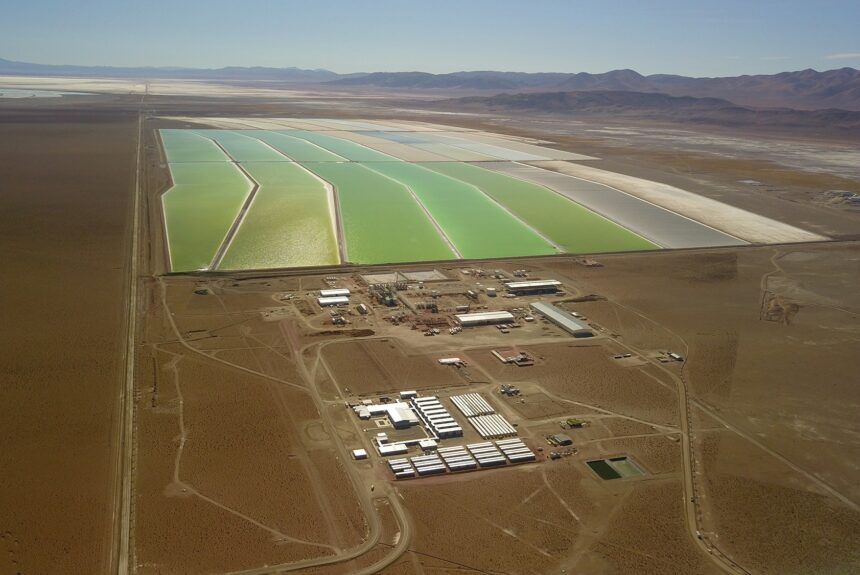As auto manufacturers scale up the production of electric vehicles (EVs), more critical mineral supplies will be necessary to meet the rising demand for batteries. General Motors (GM), which plans to be all-electric by 2035, addresses this problem by backing lithium projects in the United States and Argentina.
>>>READ: How America Can Diversify its Critical Mineral Supply Chain
GM recently announced plans to invest $650 million in Lithium Americas. Formerly Western Lithium USA Corp., Lithium Americas is a resource company currently focused on two different lithium development projects. These two projects are the Cauchari-Olaroz project, located in Argentina, and the Thacker Pass project, located in the state of Nevada. Lithium is used primarily in EV battery production because the metal has a high energy density and withstands charging very well. Many companies in the United States and around the world are facing higher costs for critical minerals and exploring ways to ensure they are accessing a secure and ethical supply chain.
This investment is the largest investment an automaker has made to secure raw material sources for batteries in history.
“Direct sourcing critical EV raw materials and components from suppliers in North America and free-trade-agreement countries helps make our supply chain more secure, helps us manage cell costs, and creates jobs,” stated GM chairwoman and CEO Mary Barra.
>>>>READ: Greenland’s Rare Earths Could Be Key to Securing American Innovation
The projections for GM’s EV branch make this investment not just smart, but necessary. Barra noted in a shareholder letter that 2023 would be “a breakout year” for GM’s EV department. The automaker is projected to finish production of 400,000 EVs in the coming months.
GM’s investment is tied to lithium coming from the Thacker Pass project here in the United States. Thacker Pass is expected to become operational in 2026. The mine will create 1,000 new jobs during construction and maintain 500 jobs during operations. Importantly, Lithium America’s mineral extraction is among the most environmentally friendly in the world according to analysis from The Breakthrough Institute:
“The technique being used by Lithium Americas is actually one of the less environmentally harmful methods as it decreases risks to air and water quality by actively backfilling, in which excavated material is used to refill the mine. Sulfuric acid leaching is considered a green mining technique since it can result in higher preservation of elements like thorium which have been identified by a geochemical characterization of Thacker Pass by the Lithium Nevada Corporation. This makes the extraction of these elements for specialized waste processing and economic use more feasible. Much of the water used during the process will be recycled which is important to note given the concerns around lowering the water table.”
The $650 million investment means that GM has exclusive access to lithium resources from the first phase of the Thacker Pass mine. The automaker will also have the right of first offer on anything coming from the mine’s second phase.
“The agreement with GM is a major milestone in moving Thacker Pass toward production while setting a foundation for the separation of our U.S. and Argentine businesses,” said Lithium Americas’ president and CEO Jonathan Evans. “This relationship underscores our commitment to develop a sustainable domestic lithium supply chain for electric vehicles. We are pleased to have GM as our largest investor, and we look forward to working together to accelerate the energy transition while spurring job creation and economic growth in America.”
As C3 Solutions’ Nick Loris pointed out in recent testimony before Congress, increasing mining operations in the United States and other allied countries is crucial to developing a more environmentally friendly critical mineral supply chain.
“The more the U.S. and other developed countries extract their own resources, the fewer minerals they will need to import from countries that have lax environmental standards and use morally unconscionable labor practices. At a minimum, domestic mining proposals should be granted a rigorous environmental review process rather than be placed off limits before any review is conducted.”
By making this sort of landmark investment, GM will be able to avoid some cost increases and supply chain issues while expanding EV production in the coming years. That is all good news for consumers who are looking forward to lower prices on EVs, and a great thing for the EV revolution in general.
Kelvey Vander Hart is a native Iowan, a member of the American Conservation Coalition, and a communications specialist at Reason Foundation.
The views and opinions expressed are those of the author’s and do not necessarily reflect the official policy or position of C3.
